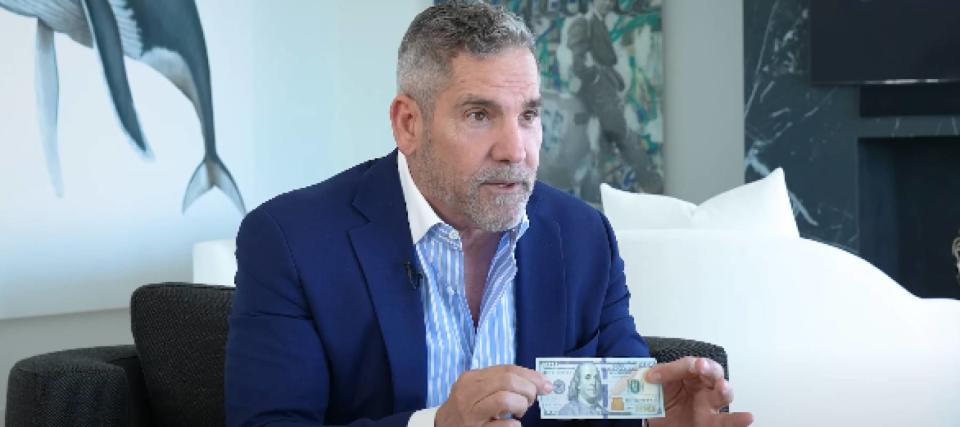Grant Cardone calls idea of emergency savings a ‘bank myth’ — and challenges adding home equity to your net worth

Most financial experts would press the importance of having a financial cushion for unexpected emergencies. What they would disagree on is how many months’ expenses you should plan to set aside — for Dave Ramsey, you should be prepared to cover three to six months, while Suze Orman now says you should plan for up to a year.
However, real estate mogul Grant Cardone rejects the concept entirely.
Don't miss
Commercial real estate has beaten the stock market for 25 years — but only the super rich could buy in. Here's how even ordinary investors can become the landlord of Walmart, Whole Foods or Kroger
Cost-of-living in America is still out of control — use these 3 'real assets' to protect your wealth today, no matter what the US Fed does or says
These 5 magic money moves will boost you up America's net worth ladder in 2024 — and you can complete each step within minutes. Here's how
“I don’t need emergency savings,” he said in a recent interview with YouTube personality DJ Vlad. “This was another bank myth — you need three months of savings in case of a big emergency. Dude, if you have an emergency, you need to go to work, you need to go hustle is what you need to do.”
Cardone also foresees gloomy outcomes for those who practice saving money, stating, “Savers stay broke.”
The ‘big scam’
Cardone’s aversion to maintaining an emergency fund may be rooted in his perspective on fiat currency.
“This is the big scam right here,” he told DJ Vlad, holding up a $100 bill.
He explained that if the bill had been printed in 1973, the year DJ Vlad was born, it would still have "$100" printed on it today. However, due to the impact of inflation on the U.S. dollar's purchasing power, the bill wouldn't buy nearly as much today as it did in 1973.
“It should say $11,” Cardone remarked.
Over the decades, inflation has indeed eroded the purchasing power of money for Americans. According to the inflation calculator from the Federal Reserve Bank of Minneapolis, $100 in 2023 was equivalent to just $14.57 in 1973 dollars.
Given this stark reality check, one might wonder how to hedge against inflation. Real estate — a favorite of Cardone’s — is one well-known option. As the price of raw materials and labor increases, new properties are more expensive to build, driving up the price of existing real estate.
However, if you think owning a home means you are all set, Cardone has a surprising message for you.
Read more: Rich young Americans have lost confidence in the stock market — and are betting on these assets instead. Get in now for strong long-term tailwinds
Home vs refrigerator?
Home equity is often a substantial component of American households’ net worth.
A study by the Pew Research Center found that the median net worth of U.S. households was $166,900 in 2021 when all assets were included. However, when home equity was excluded, the median net worth dropped significantly to just $57,900.
Cardone, however, believes that home equity shouldn’t be included in the calculation at all.
“Equity in a home should never be considered as a net worth number … It’s a place you live. It would be like counting my refrigerator on my net worth statement,” he stated.
Cardone highlighted that owning a home entails numerous related expenses and does not generate income.
“The value of your home should not be considered as a net worth item because, one, it doesn't produce income; two, it's a liability because you're paying property taxes, you probably have debt on it,” he explained, adding that a home also requires annual maintenance and incurs broker fees when you sell it.
To be sure, owning income properties also comes with many of these expenses. However, the key difference is that high-quality income properties can generate enough revenue to cover these costs and still leave you with a profit. This potential for positive cash flow makes income properties a more attractive investment compared to a primary residence, which typically does not produce income.
These days, there are many real estate investment trusts (REITs) and crowdfunding platforms that enable everyday Americans to invest in income-producing properties.
What to read next
Car insurance premiums in America are through the roof — and only getting worse. But 5 minutes could have you paying as little as $29/month
‘Baby boomers bust': Robert Kiyosaki warns that older Americans will get crushed in the 'biggest bubble in history' — 3 shockproof assets for instant insurance now
The 5 most expensive mistakes in options trading and how to avoid them
This article provides information only and should not be construed as advice. It is provided without warranty of any kind.

 Yahoo Finance
Yahoo Finance 